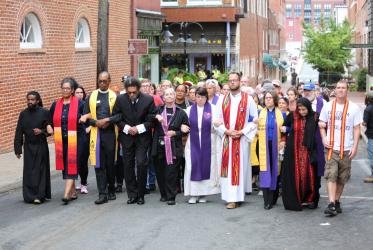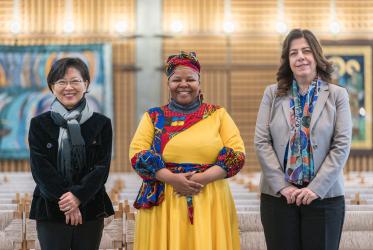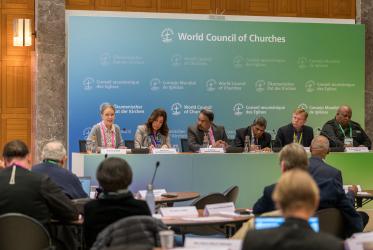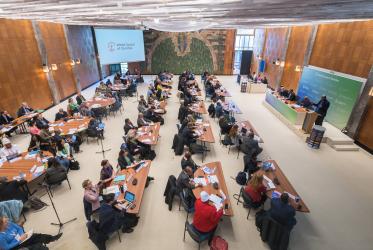Panellists shared personal memories and reflections on how the Programme to Combat Racism affected their outlook, their ministry and their deeply held personal convictions.
WCC deputy general secretary Prof. Dr Isabel Apawo Phiri, in welcoming remarks, shared the history of how, in 1969, the WCC central committee approved the establishment of the Programme to Combat Racism after years of in-depth study and prayer about the injustices that were happening in the world.
Panellist Baldwin (Boudewijn) Sjollema, first director of the WCC Programme to Combat Racism, shared when he became aware of the impact of racism on his life. “I must say the moment when I was converted was when the terrifying news came in that Martin Luther King Jr had been murdered, assassinated on the 4th of April 1968,” he said. “We were totally aware that this was a turning point for the World Council of Churches.”
Also sharing a personal perspective was Thandi Soko-De Jong, a PhD student in Intercultural Theology at the Protestant Theological University in Groningen, the Netherlands. “The Programme to Combat Racism called on churches, especially those that did not see themselves as victims of racism, to act in solidarity with them instead of giving the usual token support.”
Panellist Marilia Alves Schüller, former WCC Programme to Combat Racism executive staff (from 1992-2006), expressed deep appreciation for those who created the programme’s vision.
“As a Christian, I started to reflect theologically on what it meant to be a child of God, and an African descent woman and that really took me to become engaged in the struggle against racism in the Methodist Church in particular,” she said.
Dr Karen Nazaryan, executive director of the Armenia Inter Church Round Table Foundation, said that a turning point for him was when he was attending the WCC Assembly in Zimbabwe, and Nelson Mandela came to greet the assembly and express his thanks. “Fifty years ago, the WCC stepped into the Programme to Combat Racism. It was a really revolutionary step,” he said.
Rev. Dr Iva Carruthers, founding trustee and general secretary of the Samuel DeWitt Proctor Conference and founding director of the Center for Reparatory Justice, Transformation and Remediation at McCormick Theological Seminary, also shared a very personal reflection.
The challenge of a lived liberation theology in the church, she said, “affirmed the transnational content of my work.”
Rev. Frank Chikane, moderator of the WCC Commission of the Churches on International Affairs, spoke about how the Programme to Combat Racism demanded that churches “go beyond charitable aid to victims of the system and strengthen the groups of the racially oppressed to resist oppression.” This was for him, he added, “the best inspiration I could have in my faith and in my life as a Christian because I was tired of a church that made statements but did nothing.”
The Programme to Combat Racism, added Chikane, “said we must go beyond words to action.”
Participants in the webinar also advised the WCC on how to execute the mandate of the new programme.







